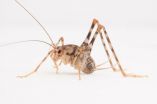(Press-News.org) ROCHESTER, Minn. — How well patients recover from cancer surgery may be influenced by more than their medical conditions and the operations themselves. Family conflicts and other non-medical problems may raise their risk of surgical complications, a Mayo Clinic study has found. Addressing such quality-of-life issues before an operation may reduce patients' stress, speed their recoveries and save health care dollars, the research suggests. The study specifically looked at colon cancer patients, and found that patients with a poor quality of life were nearly three times likelier to face serious postoperative complications.
The findings are published in the Journal of Gastrointestinal Surgery.
"We know that quality of life is a very complex thing, but we can now measure it and work with it almost like blood pressure," says lead author Juliane Bingener, M.D., a gastroenterologic surgeon at Mayo Clinic in Rochester. "We can say, 'This is good, this is in the normal range, but this one here, that is not good, and maybe we should do something.'"
Quality of life as measured in the study is about more than happiness and how well people feel physically, Dr. Bingener says. It also includes the financial, spiritual, emotional, mental and social aspects of their lives and whether their needs are being met.
Researchers studied 431 colon cancer surgery patients and found that before surgery, 13 percent had a quality of life deficit, defined as an overall quality of life score of less than 50 on a 100-point scale.
Nearly three times as many patients who entered surgery with a quality of life deficit experienced serious post-surgery complications as those with a normal or good quality of life score. Patients with a postoperative complication spent 3.5 days longer in the hospital on average than those who didn't.
"The question I'm exploring is whether, if we understand before surgery that someone is in the red zone for quality of life, can we do something to help them cope with the new stress that's going to come, so they're better equipped to go through surgery?" Dr. Bingener says.
Preventing complications by intervening with behavioral therapy or other assistance would likely cost much less than an ICU stay for an infection after major surgery, Dr. Bingener notes.
Stress can weaken patients' immune response, putting them at higher risk of infection. A patient's outlook on life can also influence how active they are in working to recover.
"You have a surgery, you're lying there in pain, now you wonder, 'Why should I even get up and walk around? Why do I have to do these deep-breathing exercises? I don't feel like it.' You might get pneumonia much faster than somebody who says, 'Oh, I have to get up. There's something worth living for, my quality of life is good and I need to get back to that,'" Dr. Bingener says.
The study is part of ongoing work by Mayo to identify and address factors that can influence patients' recovery from cancer surgery, to help improve their outcomes. Years ago, physicians were just concerned with whether patients survived cancer, because survival was so hard to achieve, Dr. Bingener says. Now, there is growing awareness of the mind's influence on the body's health.
"We're understanding much better now that patients are not just a body with a disease: There's a whole person with that, and everything plays together," Dr. Bingener says. "Now that survival is possible, we want to achieve it in a way that preserves normal life for patients as much as possible. And we think that's probably also the most economical way to go."
INFORMATION:
The current study was funded by National Institute of Diabetes and Digestive and Kidney Diseases grant K23DK93553.
The study's senior author is Heidi Nelson, M.D., a colon and rectal surgeon, the Fred C. Andersen Professor and chair of the Department of Surgery at Mayo Clinic in Rochester.
The research used data from Clinical Outcomes of Surgical Therapy (COST) trial NCCTG 93-46-53, funded by the National Cancer Institute in association with the North Central Cancer Treatment Group. Dr. Nelson was the COST trial's lead investigator.
About Mayo Clinic
Recognizing 150 years of serving humanity in 2014, Mayo Clinic is a nonprofit worldwide leader in medical care, research and education for people from all walks of life. For more information, visit 150years.mayoclinic.org, MayoClinic.org or http://newsnetwork.mayoclinic.org/.
Family conflicts, other non-physical worries before cancer surgery raise patients' complication risk
Meeting non-medical needs ahead of operations can aid recovery, cut health care costs, study suggests
2014-09-02
ELSE PRESS RELEASES FROM THIS DATE:
Future solar panels
2014-09-02
This news release is available in Spanish.
The solar panels we see tend to be rigid and black. Organic photovoltaic technology, by contrast, enables more translucent and more flexible solar panels in a range of colours to be manufactured. But this technology needs to meet certain requirements if it is to be accepted on the market: greater efficiency, longer duration and low production cost. So this research has set out "to analyse the capacity new materials have to absorb solar energy as well as to seek appropriate strategies to move from the lab to actual operations," ...
Study conducted on rats suggests that hyperproteic diets can be beneficial for bones
2014-09-02
This news release is available in Spanish.
Researchers at the University of Granada have found, through an experiment conducted on rats, that hyperproteic diets could be beneficial for bones, which would be of great use for groups with bone disease problems, such as the elderly or post-menopausic females.
Their research has also revealed that vegetal protein—in the case of the present study, soy protein—is preferable to animal protein (such as whey protein), since the former increased the level of calcium in bones by as much as seven per cent.
In an article published ...
Over-the-counter pain reliever may restore immune function in old age
2014-09-02
New research involving mice suggests that the key to more youthful immune function might already be in your medicine cabinet. In a report published in the Journal of Leukocyte Biology scientists show that macrophages from the lungs of old mice had different responses to Mycobacterium tuberculosis than macrophages from young mice, but these changes were reversed by ibuprofen.
"Inflammation in old age can have significant consequences on immune function," said Joanne Turner, Ph.D., a researcher involved in the work from the Department of Microbial Infection and Immunity ...
Coffee increases prediabetes risk in susceptible young adults
2014-09-02
Barcelona, Spain – Tuesday 2 September 2014: Coffee increases the risk of prediabetes in young adults with hypertension who are slow caffeine metabolisers, according to results from the HARVEST study presented at ESC Congress today by Dr Lucio Mos from Italy. People who drank more than three cups of coffee per day doubled their risk of prediabetes.
Dr Mos said: "Lifestyle factors are very important for the prognosis of young people with hypertension. In a previous analysis of HARVEST (Hypertension and Ambulatory Recording VEnetia STudy) we found that coffee was a risk ...
The Lancet: European Society of Cardiology Congress 2014 media alert
2014-09-02
The Lancet is pleased to announce that the following papers will be published to coincide with presentation at the ESC Congress 2014, taking place in Barcelona, Spain, 30 August – 3 September 2014:
Ultrathin strut biodegradable polymer sirolimus-eluting stent versus durable polymer everolimus-eluting stent for percutaneous coronary revascularisation (BIOSCIENCE): a randomised, single-blind, non-inferiority trial, Windecker et al
Refinements in stent design affecting strut thickness, surface polymer, and drug release have improved clinical outcomes of drug-eluting stents. ...
War between bacteria and phages benefits humans
2014-09-02
BOSTON (September 2, 2014) — In the battle between our immune systems and cholera bacteria, humans may have an unknown ally in bacteria-killing viruses known as phages. In a new study, researchers from Tufts University, Massachusetts General Hospital, Partners In Health, Haiti's National Public Health Laboratory, and elsewhere, report that phages can force cholera bacteria to give up their virulence in order to survive. Importantly, the study — published in eLife — found that cholera's mutational escape from phage predation occurs during human infection.
First author ...
Migrating birds sprint in spring, but take things easy in autumn
2014-09-02
Passerine birds, also known as perching birds, that migrate by night tend to fly faster in spring than they do in autumn to reach their destinations. This seasonal difference in flight speed is especially noticeable among birds that only make short migratory flights, says researcher Cecilia Nilsson of Lund University in Sweden, in Springer's journal Behavioral Ecology and Sociobiology.
Nilsson, in a group led by professor Thomas Alerstam, used a tracking radar to measure over three years the speed by which birds flew over Falsterbo Peninsula, a bird migratory hot spot ...
Nano-forests to reveal secrets of cells
2014-09-02
Vertical nanowires could be used for detailed studies of what happens on the surface of cells. The findings are important for pharmaceuticals research, among other applications. A group of researchers from Lund University in Sweden have managed to make artificial cell membranes form across a large number of vertical nanowires, known as a 'nano-forest'.
All communication between the interior of a cell and its surroundings takes place through the cell membrane. The membrane is a surface layer that holds the cell together and that largely comprises lipids, built of fatty ...
Scientists find possible neurobiological basis for tradeoff between honesty, self-interest
2014-09-02
What's the price of your integrity? Tell the truth; everyone has a tipping point. We all want to be honest, but at some point, we'll lie if the benefit is great enough. Now, scientists have confirmed the area of the brain in which we make that decision.
The result was published online this week in Nature Neuroscience.
"We prefer to be honest, even if lying is beneficial," said Lusha Zhu, the study's lead author and a postdoctoral associate at the Virginia Tech Carilion Research Institute, where she works with Brooks King-Casas and Pearl Chiu, who are assistant professors ...
Researchers find Asian camel crickets now common in US homes
2014-09-02
With their long, spiky legs and their propensity for eating anything, including each other, camel crickets are the stuff of nightmares. And now research from North Carolina State University finds that non-native camel cricket species have spread into homes across the eastern United States.
"The good news is that camel crickets don't bite or pose any kind of threat to humans," says Dr. Mary Jane Epps, a postdoctoral researcher at NC State and lead author of a paper about the research.
The research stems from a chance encounter, when a cricket taxonomist found an invasive ...
LAST 30 PRESS RELEASES:
Under the Lens: Microbiologists Nicola Holden and Gil Domingue weigh in on the raw milk debate
Science reveals why you can’t resist a snack – even when you’re full
Kidney cancer study finds belzutifan plus pembrolizumab post-surgery helps patients at high risk for relapse stay cancer-free longer
Alkali cation effects in electrochemical carbon dioxide reduction
Test platforms for charging wireless cars now fit on a bench
$3 million NIH grant funds national study of Medicare Advantage’s benefit expansion into social supports
Amplified Sciences achieves CAP accreditation for cutting-edge diagnostic lab
Fred Hutch announces 12 recipients of the annual Harold M. Weintraub Graduate Student Award
Native forest litter helps rebuild soil life in post-mining landscapes
Mountain soils in arid regions may emit more greenhouse gas as climate shifts, new study finds
Pairing biochar with other soil amendments could unlock stronger gains in soil health
Why do we get a skip in our step when we’re happy? Thank dopamine
UC Irvine scientists uncover cellular mechanism behind muscle repair
Platform to map living brain noninvasively takes next big step
Stress-testing the Cascadia Subduction Zone reveals variability that could impact how earthquakes spread
We may be underestimating the true carbon cost of northern wildfires
Blood test predicts which bladder cancer patients may safely skip surgery
Kennesaw State's Vijay Anand honored as National Academy of Inventors Senior Member
Recovery from whaling reveals the role of age in Humpback reproduction
Can the canny tick help prevent disease like MS and cancer?
Newcomer children show lower rates of emergency department use for non‑urgent conditions, study finds
Cognitive and neuropsychiatric function in former American football players
From trash to climate tech: rubber gloves find new life as carbon capturers materials
A step towards needed treatments for hantaviruses in new molecular map
Boys are more motivated, while girls are more compassionate?
Study identifies opposing roles for IL6 and IL6R in long-term mortality
AI accurately spots medical disorder from privacy-conscious hand images
Transient Pauli blocking for broadband ultrafast optical switching
Political polarization can spur CO2 emissions, stymie climate action
Researchers develop new strategy for improving inverted perovskite solar cells
[Press-News.org] Family conflicts, other non-physical worries before cancer surgery raise patients' complication riskMeeting non-medical needs ahead of operations can aid recovery, cut health care costs, study suggests






